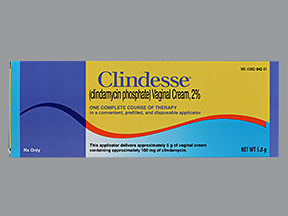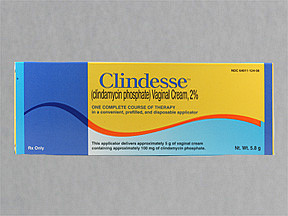CLINDAMYCIN PHOSPHATE SINGLE DOSE CREAM - VAGINAL
PHONETIC PRONUNCIATION: (klin-da-MYE-sin)
COMMON BRAND NAME(S): Clindesse
GENERIC NAME(S): clindamycin phosphate
Uses
USES: This medication is used to treat a certain type of vaginal infection (bacterial vaginosis) in women who are not pregnant. Clindamycin is an antibiotic that works by stopping the growth of bacteria.
How to use CLINDAMYCIN PHOSPHATE SINGLE DOSE CREAM - VAGINAL
HOW TO USE: Read the Patient Information Leaflet that comes with this product for instructions on the proper use of this medication. Consult your doctor or pharmacist if you have any questions. This product is for vaginal use only. Wash your hands before and after use. Avoid contact of this cream with your eyes. If it gets into your eyes, wash them right away with plenty of water. Call your doctor if eye irritation persists. Insert the applicator filled with medication high into the vagina and press the plunger to release the medication. This product is given as a single dose. This product may be used at any time of the day because it is designed to leak very little medication out of the vagina. Tell your doctor if your condition does not improve after several days.
Side Effects
Precautions
Interactions
Overdose
Images
Reviews
Disclaimer
IMPORTANT: HOW TO USE THIS INFORMATION: This is a summary and does NOT have all possible information about this product. This information does not assure that this product is safe, effective, or appropriate for you. This information is not individual medical advice and does not substitute for the advice of your health care professional. Always ask your health care professional for complete information about this product and your specific health needs.


No Reviews Yet